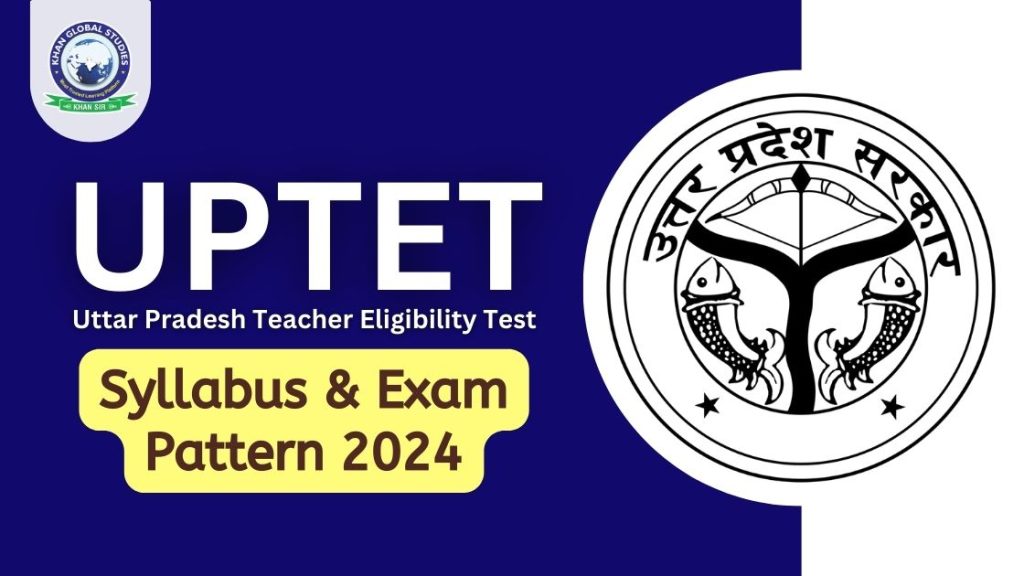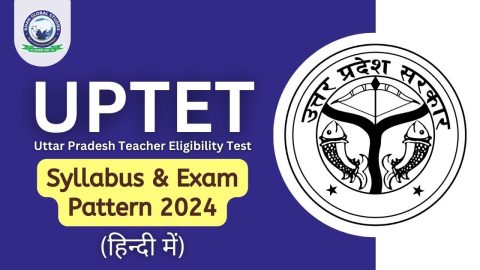UP Education Service Selection Commission (UPESSC) has released the UPTET Syllabus 2024 for Papers 1 and 2 on its official website. Candidates should review the syllabus carefully for effective preparation for the UPTET exam. The examination consists of two papers: Paper I and Paper II. Paper I is for those who want to teach classes I-V, while Paper II is for those who want to teach classes VI-VIII. This article comprehensively outlines the UPTET syllabus and UPTET exam pattern 2024 and contains all other relevant information for the candidates.
UPTET Overview
Newcomers, who are starting to prepare for UPTET 2024 should know that UPTET is a state-level examination conducted to appoint qualified teachers for primary and middle-level government-aided schools within Uttar Pradesh (UP). For more details about UPTET Syllabus 2024 please see the table below.
| Conducting Body | UPESSC (UP Education Service Selection Commission) |
| Exam Name | UPTET (Uttar Pradesh Teacher Eligibility Test) |
| Exam Frequency | Once a Year |
| Mode of Exam | Offline |
| Exam Time Duration | 2 Hours 30 Minutes (150 Minutes) |
| Language | English and Hindi |
| Question Types | Objective (MCQs) |
| Maximum Marks | 150 Marks (for each paper) |
| Negative Marking | No Negative Marking |
| Purpose of Examination | To check the eligibility of candidates for primary and upper-primary level |
| Official Website | http://updeled.gov.in/ |
UPTET Syllabus 2024
Uttar Pradesh Basic Education Board (UPBEB) will release UPTET Notification 2024 soon on the official website. To be successful in the exam, candidates must stay updated with the UPTET Syllabus 2024 PDF for Papers 1 & 2. UPTET Syllabus 2024 will provide information about the weightage of each section, allowing candidates to plan their examination strategy accordingly.
UPTET Paper 1 Syllabus 2024 (Class I-V)
The UPTET Paper I syllabus consists of five sections, including Child Development, Teaching and Pedagogy, Language 1 (Hindi), Language 2 (English), and Mathematics and EVS. The curriculum is taken from the topics mentioned in NCERT books for classes I-V. A detailed, subject-wise paper is given below.
| Subject | Topics |
| Child Development and Pedagogy | Meaning, necessity, and scope of child development Stages of child development Physical, mental, emotional, and language development Factors influencing development Principles of learning Teaching methods Inclusive education and guidance counselling, etc. |
| Language I (Hindi) | हिंदी वर्णमाला (स्वर, व्यंजन) स्वर और व्यंजन शब्दों का निर्माण वाक्य निर्माण संधि, विलोम, समनार्थी व्याकरण के नियम मुहावरे और कहावतें आदि। हिंदी शिक्षाशास्त्र भाषा शिक्षण सिद्धांत शिक्षा में भाषा की भूमिका भाषा संबंधी कठिनाइयाँ एवं विकार भाषा कौशल शिक्षण-अधिगम सामग्री उपचारात्मक शिक्षण, आदि। |
| Language II (English/Urdu/Sanskrit) | English: Unseen passage Sentence structure Parts of speech Tenses Articles Punctuation Active & passive voice Singular & plural, gender. Urdu: Unseen passage, literature, grammar. Sanskrit: Unexplained masculine, Unseen passage, Nouns, Unexplained feminine, Unexplained neuter, Postpartum feminine, Post masculine, Postpartum masculine, Introduction to Sanskrit names of household, family, surroundings, animals, birds, household use items, Pronouns, Sandhi – Treaty of simple words and their separation (long treaty), etc. |
| Mathematics | Addition Subtraction Multiplication Division Fractions Decimals Percentages Profit and loss Simple interest Geometry ShapesAngles Triangles Circles Measurement Time Weight Capacity Data interpretation |
| Environmental Studies | Family, Food, Health, and hygiene Accommodation Trees plant Local professions Water, traffic, and communication India and our region’s geography Constitution and governance system Environmental studies and education Social responsibility towards the environment |
UPTET Paper 2 Syllabus 2024 (Class VI-VIII)
The detailed UPTET Paper 2 syllabus for UPTET 2024 is given below, covering all the sub-topics of each subject. Candidates are advised to read the UPTET Paper 2 syllabus section-wise carefully to understand the total marks distribution of UPTET and prepare accordingly.
| Subject | Topics |
| Child Development and Learning Methods | Child Development: Meaning, necessity and scope of child development, stages of child development, physical development, mental development, emotional development, language development – development of expressive ability, creativity and development of creative ability, etc. Meaning and principles of learning: Meaning of learning, its affecting factors, Influential methods of learning, Rules of learning – The main rules of learning of Thorndike’s and their importance in learning, etc. Teaching and Learning Methods: Meaning and purpose of teaching, communication, principles of teaching, sources of teaching, teaching methods, new methods of teaching (approach), basic teaching, and basic skills of teaching. Inclusive Education- guidance and counselling: Educational inclusion means identity, type, resolution, eg: excluded class, language, religion, caste, region, colour, gender, physical skills (visually impaired, hearing impaired and speech/bone impaired), mental efficiency, etc. |
| Language I (Hindi) | अपठित अनुच्छेद हिंदी वर्णमाला (स्वर, व्यंजन)वर्णों के मेल से मात्रिक तथा अमात्रिक शब्दों की पहचान वाक्य रचना हिंदी की सभी ध्वनियों के पारस्परिक अंतर की जानकारी विशेष रूप से – ष, स, ब, व, ढ, ड, क्ष, छ, ण तथा न की ध्वनियाँ हिंदी भाषा की सभी ध्वनियों, वर्णों अनुस्वार एव चन्द्रबिंदु में अंतर संयुक्ताक्षर एवं अनुनासिक ध्वनियों के प्रयोग से बने शब्द सभी प्रकार की मात्राएँ विराम चिह्नों यथा – अल्प विराम, अर्द्धविराम, पूर्णविराम, प्रश्नवाचक, विस्मयबोधक, चिह्नों का प्रयोग अधिगम और अर्जन भाषा अध्यापन के सिद्धांत सुनने और बोलने की भूमिका: भाषा का कार्य तथा बालक इसे किस प्रकार एक उपकरण के रूप में प्रयोग करते है मौखिक और लिखित रूप में विचारों के संप्रेषण के लिए किसी भाषा के अधिगम में व्याकरण की भूमिका पर निर्णायक संदर्श एक भिंन कक्षा में भाषा पढाने की चुनौतियाँ भाषा की कठिनाइयाँ त्रुटिया और विकार भाषा कौशल भाषा बोधगम्यता और प्रवीणता का मुल्यांकन करना: बोलना, सुनना, पढना, लिखना अध्यापन – अधिगम सामग्रियां: पाठ्यपुस्तक, मल्टी मीडिया सामग्री, कक्षा का बहुभाषायी संसाधन उपचारात्मक अध्यापन, etc. |
| Language II (English) | Reading unseen passages Questions on comprehension, inference, grammar and verbal ability Pedagogy of language development Principles of language teaching Role of listening and speaking A critical perspective on the role of grammar in learning a language for communicating ideas verbally and in written form; Challenges of teaching language in a diverse classroom Language difficulties, errors and disordersLanguage skills Evaluating language comprehension and proficiencyTeaching-learning materials Remedial teaching, etc. |
| Language II (Urdu) | Unseen passage Knowledge of the famous life and poetry of famous tribes and poets MukhtalifAsnaafAdab such as Maznoom, Afsana Murcia, Masnavi Dastan, etc. Praise to Ma, Amsal Masala of perfect tamarind and afflux Information about Ism, Jamir, Sifat, Mutzadalfaz, Wahid, Mojkkar, Moannas et cetera. Saints (Tasbeeh and Istaara, Talmih, Maraatunzir), etc Idioms, meeting JurbalAmsal MukhtalifSamajMusayal like the atmosphere of Aloodgi Nabrabari, TalimBaraa’mn, Adame, Tagazia To understand the social and Khaliq Akbar present in the beliefs, stories, Hikayatas, and memoirs, etc. |
| Language II (Sanskrit) | Nouns Unexplained feminine Unexplained neuter Post masculine Postpartum masculine Postpartum feminine Introduction to Sanskrit names of household, family, surroundings, animals, birds, household use items Pronouns Verb Use of Sanskrit words for major body parts Incessant Sandhi – Treaty of simple words and their separation (long treaty) Numbers – Knowledge of numbers in Sanskrit Gender, vowel, vowel type, substitution, type of consonant, anusvara, and nasal consonant Compositions of poets and writers, etc. |
| Mathematics | Number system Algebra Geometry Mensuration Data handling, etc. |
| Science | Food Materials The world of the living Natural resources How things work Natural phenomena, etc. |
| Social Studies and Others | Our body My family Work & play Plants and animals Our food Air Civics Horticulture and fruit conservation Social and political science Teaching related issues Home Science Pedagogical issues |
| History Sources of knowing the history Stone Culture, Copper Stone Culture, Vedic Culture India of the sixth century B.C The early States of India Establishment of the Mauryan Empire in India Non-Mauryan India, Gupta period, Rajput India, Punyabhuti dynasty, states of South India The arrival of Islam in India Establishment, expansion, and disintegration of the Delhi Sultanate Mughal Empire, Culture, Fall The arrival of European powers in India and the establishment of the English state Expansion of Company State in India Renaissance in India, Rise of Nationalism in India The independence movement, independence, the partition of India Challenges of Independent India, etc. | |
| Geography Earth in the Solar System, Globe – Determination of locations on Earth, Earth’s movements. Mapping, Four Circles of Earth, Structure – Earth’s Structure, Major Structure of Earth India in the world, India’s physical form, soil, vegetation and wildlife, India’s climate, India’s economic resources, traffic, trade, and communication. Uttar Pradesh – Location in India, Political Department, Climate, Soil, Vegetable and Wildlife Agriculture, Mineral Industry – Business Population and Urbanization Surface forms, changing factors. (Internal and external factors) Atmosphere, hydrosphere Major natural regions and life of the world Mineral Resources, Industries Disaster and Disaster Management | |
| Environmental Studies Environment, natural resources, and their utility Natural Balance Use of resources Impact of population growth on the environment, environmental pollution Waste Management, Disasters, Environmentalist, Award in the field of Environment, Environment Day, Environmental Calendar |
UPTET Exam Pattern 2024
UPTET Paper 1 exam pattern consists of five sections: Child Development and Methodology and Pedagogy, Language 1, Language 2, Mathematics and Environmental Studies. Each section is of 30 marks. In UPTET Paper 2, there are five sections, namely Child Development & Methodology & Pedagogy, Language 1, Language 2, Mathematics and Science or (Social Studies).
UPTET Exam Pattern 2024 for Paper 1
The UPTET exam pattern 2024 for Paper 1 consists of the following sections with respective number of questions and marks. Total number of questions is 150, and total marks for Paper 1 is 150.
| Subject | No. of Questions | Maximum Marks | Time Duration |
| Child Development and Pedagogy | 30 | 30 | 2 Hours 30 Minutes (150 Minutes) |
| Language I (Hindi) | 30 | 30 | |
| Language II (English/Urdu/Sanskrit) | 30 | 30 | |
| Mathematics | 30 | 30 | |
| Environmental Studies | 30 | 30 | |
| Total | 150 | 150 |
UPTET Exam Pattern 2024 for Paper 2
The UPTET exam pattern 2024 for Paper 2 consists of the following sections with the respective number of questions and marks. The UPTET exam pattern 2024 for Paper 2 consists of the following sections.
| Subject | No. of Questions | Maximum Marks | Time Duration |
| Child Development and Pedagogy | 30 | 30 | 2 Hours 30 Minutes (150 Minutes) |
| Language I (Hindi) | 30 | 30 | |
| Language II (English/Urdu/Sanskrit) | 30 | 30 | |
| (a) Mathematics and Science (for Mathematics and Science teachers)OR(b) Social Studies/Social Science (for Social Studies/Social Science teachers) | 60 | 60 | |
| Total | 150 | 150 |
UPTET Exam Preparation: Tips for Success
The Uttar Pradesh Teacher Eligibility Test (UPTET) is an important step in your teaching career. To ensure success, consider the following preparation tips:
- Understand the Syllabus: Familiarize yourself with the UPTET syllabus. Cover all topics thoroughly to ensure comprehensive understanding.
- Make a Study Plan: Plan your study schedule strategically. Allot specific time for each subject, focus on your weak areas while revising the stronger topics.
- Practice Previous Question Papers: Solve previous years’ question papers and sample papers. This helps in understanding the exam pattern and increases your confidence.
- Time Management: Develop effective time management skills. Practice solving questions within the stipulated time to increase speed and accuracy during the exam.
- Focus on Child Development and Pedagogy: As an important section in UPTET, give priority to Child Development and Pedagogy. Understand child psychology and teaching methods.
- Stay updated with Current Affairs: Stay updated with current affairs especially those related to the education sector. This knowledge is essential for the pedagogy section.
- Concept clarity in Mathematics: Ensure a strong foundation in mathematical concepts. Focus on understanding the basics, as this is a major part of the Paper I syllabus.
- Language Proficiency: Enhance your language proficiency for Paper II. Focus on grammar, comprehension and language-based questions.
- Use Revision Techniques: Use effective revision techniques like flashcards, mind maps and summaries. Regular revision reinforces your learning.
- Mock Tests and Assessment: Give regular mock tests to evaluate your preparation. Analyze your performance and identify areas that need improvement.
- Healthy Lifestyle: Maintain a healthy lifestyle during the preparation phase. A balanced diet and adequate sleep contribute to better concentration.
- Seek Guidance: If you face challenges in specific subjects, seek guidance from teachers, counsellors or online resources to clear doubts and strengthen your understanding.
- Stay Calm and Positive: Develop a positive mindset. Stress management is important, so practice relaxation techniques to stay calm during the exam.
Remember, consistent effort and a well-structured preparation strategy are the keys to cracking the UPTET exam. May you be successful!




